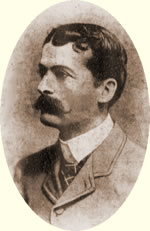 |
|
||||||||
 |
| Ernest Ford |
FORD, ERNEST (b. Warminster, Wilts, Feb. 17, 1858; d. June 1919), conductor and composer, was the son of the vestry clerk and organist of the Minster there. From 1868-73 he was a chorister in Salisbury Cathedral.
In 1875 he won the first Goss Scholarship at the R.A.M., where he studied
under Sullivan.
Later Ford spent some time in Paris studying under Lalo, whence he went to
America, where, in celebration of the 250th anniversary of the foundation
of Harvard University, a motet by him, a setting of the Psalm 'Domine
Deus,' was the chief musical work performed. At one time Ford was official
accompanist at the Saturday Popular Concerts, St. James's Hall, London,
and on the opening of the Royal English Opera House he was selected with
F. Cellier to conduct Sullivan's 'Ivanhoe.'
Later he became conductor of the Trafalgar (now the Duke of York's) Theatre, where the comic opera 'The Wedding Eve' was produced in London with music revised and mainly composed (as regards the second and third acts) by Ford; and of the Empire Theatre, where much of the music to the ballets produced there between 1894 and 1897 was composed by him.
In 1897 he became conductor of the Royal Amateur Orchestral Society. For the Empire he composed the ballets 'La Frolique,' 'Brighton Pier,' 'Faust' and 'La Danse;' there exists a volume of beautiful settings of poems by Shelley; while his operas and operettas include 'Daniel O Rourke' (1884); 'Nydia' (a duologue by Justin H. M Carthy, 1889); 'Joan' (Robert Martin, 1890); 'Mr. Jericho' (operetta by H. Greenbank, 1893); 'Jane Annie' (libretto by J. M. Barry and Sir A. Conan Doyle), produced at the Savoy, May 13, 1893; a cantata, 'The Eve of the Festa.
Page modified 6 August 2019
